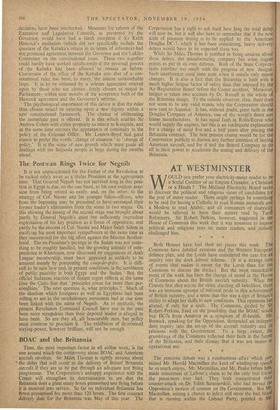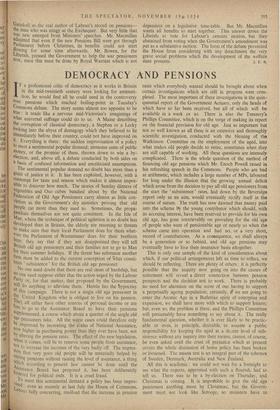AT WESTMINSTER
WOULD you prefer your electricity-meter reader to be a Social Creditor or an Empire Crusader, a Christian or a Hindu ? The Midland Electricity Board seeks to discover the political and religious views of candidates for the post of meter reader. There might perhaps be something to be said for having a Catholic to read Roman numerals and a Moslem to read Arabic; and all consumers of electricity would be relieved to have their meters read by Tariff Reformers. Sir Robert Perkins, however, suggested in the House of Commons this week that it was nonsense to impose political and religious tests on meter readers, and ,nobody challenged him. * * * Both Houses have had their set pieces this week. The Commons have debated pensions and, the Western European defence plan, and the Lords have considered the case for an inquiry into the dock labour scheme. (It is a strange turn of events that makes it easier for the LOrds than for the Commons to discuss the docks.) But the most remarkable event of the week has been the change of mood in the House of Commons about the British aircraft industry. When the Comets first shot across the skies, dazzling all beholders, there was an immense upsurge of national pride in this achievement of British industry, and a sense that this was a sign of Britain's ability to adapt her skills, to new conditions. This optimism has abated, if only for a spell. The Commons, guided by sir Robert Perkins, fixed on the possibility that the BOAC would buy DC7s from America as a symptom of ill-health. Mr. Beswick, speaking for the Opposition. demanded an indepeir dent inquiry into the set-up of the aircraft industry and its relations with the Government. To a large extent, the grumblings of the Commons reflected their faith in the future of the Britannia, and their dismay that it was not nearer to operational use. * * * Caitskell as the real author of Labour's record on pensions— the man who was stingy at the Exchequer. But very little that was new emerged from Ministers' speeches. Mr. Macmillan admitted that even if the new Pensions Bill were got through Parliament before Christmas, its benefits could not start flowing for some time afterwards. Mr. Bowen, for the Liberals, pressed the Government to help the war pensioners now. since this must be done by Royal Warrant which is not dependent on a legislative time-table. But Mr. Macmillan wants all benefits to start together. This answer drove the Liberals to vote for Labour's censure motion, but they abstained from voting when the Government's amendment was put as a substantive motion. The form of the debate prevented the House from considering with any detachment the very grave social problems which the development of the welfare











































































 Previous page
Previous page